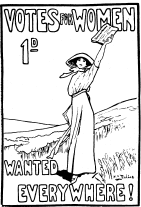
Buy | Submit | TRMGS1 | TRMGS2 | TRMGS3 | TRMGS4 |TRMGS Main | Heliograph Main
|
WHAT'S NEW?
The Complete Canal Priests Of Mars is now available!
The original publication of Canal Priests Of Mars cut slightly over a third of author Marcus L. Rowland's manuscript to fit GDW's adventure format.
The Complete Canal Priests Of Mars restores the cut material, features all new artwork by Paul Daly, and adds many useful player handouts. Enjoy the "author's cut" of a classic Space 1889 adventure, or experience it for the first time!
See our Buy It! page for more information!
Old news is still available on the News Page.
|
Those Demmed Females!
Suffragettes on Mars
by J. Ruth Dempsey
In 1840 an antislavery rally in London sparked another
movement for freedom and equality. Philadelphia Quaker Lucretia Mott was
introduced to Abolitionist Elizabeth Cady Stanton. Eight years later,
these women would convene the First Women's Rights Meeting in the
small town of Seneca Falls, New York. Attended by 300 participants, both
men and women (including the great Frederick Douglas), the convention
drew up a "Bill of Sentients Rights" speaking boldly for equal rights in
marriage, education, religion, employment and political life.
While all the amendments on equality passed by large
majorities, the referendum on the right to equality of enfranchisement (i.e. the
right to vote) proved to be a step too threatening to the men attending
the conference. Despite a passionate argument from Frederic Douglas,
the motion passed only by a small majority.
The Bill of Sentients' Rights became the first document of what
is now called the feminist movement. Its early leaders named the
women's rights movement after the one bill that had sparked so much
controversy even in Seneca Falls the suffragettes. However, the events
leading up to the American Civil War prevented the debate from going
forward since many female activists (motivated by religious feeling)
focused on Abolition rather than obtaining the vote for women.
Despite their lack of progress in politics, women were making
forward strides in other areas. In 1849, Doctor Elizabeth Blackwell
became the first female physician in America. By the late 19th century,
there were over 200 women physicians in the United States, mostly in
the Western states.
After the American Civil War, almost two-thirds of the young
male population on the East Coast was gone, having died in battle or
moved West. Many young women found themselves stepping into roles that
had been held by brothers or fathers. Among the working class, the
suffragette movement grew, women realizing that along with the vote
would hopefully come respect and credit for their work. Among the
upper classes, however, many women failed to see why working-class
women would want to "demean" themselves by such "vulgar" demands.
These wealthy women the so-called "pink overseers" had the money to
do what they wanted and so did not seek political power.
In 1869, the Wyoming Territory became the first part of the
United States to grant women the vote. Many other western territories
soon followed suit. This was not done for the sake of the ladies or
liberal political values granting women the vote increased the territory's
voting base and meant they could qualify for statehood earlier. Even
so, once granted the vote, women proved very active politically, voting
at higher rates than men. Wyoming, for example, remained at the
forefront of the feminist movement, electing women politicians, including
the first woman governor, Nellie Taylor Ross, in 1925.

In the 1872 election, Victoria Clarfin Woodhall became the
National Women's Suffrage Association candidate for President of
the United States, running on the National Radical Reformers
ticket. However, women would not be allowed to vote in national
elections until the passage of the 19th amendment to the constitution,
ratified in 1920.
By 1889, the suffragette movement was well established in
the United States and England, though the vast majority of men still
scoffed at the idea of women voting. In addition to campaigning for the vote,
suffragettes were closely associated with efforts to regulate the sale and consumption of alcohol, with
many leading women's rights leaders advocating total prohibition. Most
women saw this as a family welfare measure, arguing that many men spent
their money on liquor and neglected their wives and children.
Suffragettes in Space: 1889
Suffragettes will be encountered primarily in the areas of Mars
dominated by England and the United States: the Crown Colony of
Syrtis Major and the city of Thymiamata.
Suffragettes in the English colony have two interests. The
primary one is the investigation of the Steppe Martian tribes of the
Nepenthes-Thoth region. Travelers and explorers in that region have reported
that Martian women of these tribes enjoy a form of franchisement within
the tribe. A number of prominent English and American
suffragettes have come to Mars to investigate, since the reports, if true, have
considerable propaganda value. After all, one can well imagine the impact of a
female voice saying "Why, pray tell, are civilized women not permitted the
same rights enjoyed by a barbaric Martian female?"
The second interest of the English suffragettes is to embarrass
the English government and so gain publicity. English women, facing a
more rigid class system than their American counterparts, have been
much more prone to engage in criminal acts to attract attention to their
cause. Activities such as burning shops and hurling themselves under
carriages to cause traffic jams, all under the guise of garnering the attention
of your typical bull-headed Englishman, are common on the streets of
Syrtis Major.
The American suffragettes in Thymiamata have been drawn there
in the hopes of civilizing a city filled with sin and corruption. Liquor
flows freely around the clock in the bars in the European quarter, and
this offends the sensibilities of more than a few American women. Of
course, some women have been drawn to the city by the chance to set up
an American colony, and they are convinced that women will have the
vote then.
There are two groups of suffragettes in Thymiamata. The
Quaker-led Americans, primarily from the East coast, tend toward peaceful
demonstrations, lectures and discussions. A newcomer to the city, seeing
a sign offering "discussion and refreshments" might walk in to find
himself being plied with lemonade, cakes and "sweet reason" by a
Quaker group.
The more radical women, who hail from the American West, are
made of much sterner stuff. Their organizational center is the Women's
Christian Temperance Union, which regularly organizes attacks on
saloons led by hachet-wielding harpies. These women are much more likely
to fight than talk.
Adventure Ideas
Although suffragettes are very serious people, adventures
centered around them need not be serious. Encourage your players to adopt
an authentic 19th century male attitude (scorn mixed with
amusement), and the fun will soon begin. Here are some ideas:
1) Player characters strolling down the street encounter a
confrontation between suffragette marchers and the local constabulary. One
of the marchers is an old friend of one of the players, and appeals to
him for help. Encourage the players to roleplay and take different sides in
the tiff.
2) A female player character finds a message slipped under her
door warning her to stop associating with "unnatural and
unreasonable women." Investigation reveals threats to other feminists in town.
3) A small group of feminists in Syrtis Major are planning an
expedition to research the customs of the Steppe Nomads. It will be led by
one Amelia Witherspoon, a descendent of the Reverend Jonas
Witherspoon, Presbyterian minister and a signer of the Declaration of
Independence. She scandalized almost everyone on the trip to Mars by wearing
men's trousers. Her defense was that, having seen a picture of a gashant,
she came to the conclusion that "only a damn fool would ride one of
those things sidesaddle." Her constant companion is the Quaker Cordelia
Dodd, a prim, quiet woman whose "sweet reason" frequently curbs
Amelia's headstrong impetuosity. Cordelia may share Amelia's opinion of
Gashants, but her costume is more demure and features a divided skirt.
The characters should be hired or assigned to escort Amelia and
her party, which should include at least three or four other feminists of
varying types. The exact nature of the Martian customs relating to
women are up to the referee, but given suffragette's attitudes toward
alcohol (they are against it) and sex (they are publicly against it, as are all
good Victorians), the less "civilized" the Martian women are, the better.
Posted Monday, 04-May-2009 19:50:57 EDT
Return to Main Page
Comments to webmaster@heliograph.com
The material on this page is Copyright 2000 under the author or artist's name unless noted otherwise, and cannot be used without permission. This presentation Copyright 2000 by Heliograph, Inc. Space:1889 is a registered trademark of Frank Chadwick, all rights reserved, and is used with his permission. Most other game, movie, or book names may be trademarks of their respective holders, and use of a trademark at this site should not be construed as implying the sponsorship of the trademark holder, nor, conversely, should use of the name of any product without mention of trademark status be construed as a challenge to such status. Heck no! We love those guys.
